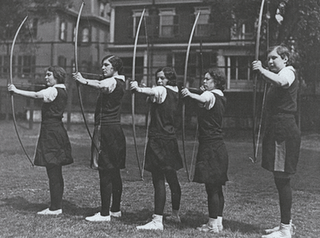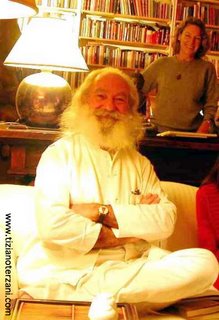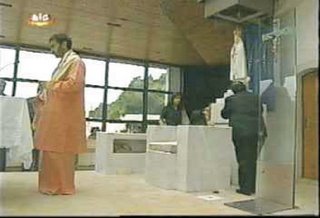Saint Irenaeus (died A.D. 202): "[The Church] is the entrance to
life; all others are thieves and robbers. On this account we are
bound to avoid them... We hear it declared of the unbelieving and
the blinded of this world that they shall not inherit the world of
life which is to come... Resist them in defense of the only true and
life giving faith, which the Church has received from the Apostles
and imparted to her sons." (Against Heresies, Book III)
Origen (died A.D. 254): "Let no man deceive himself. Outside this
house, that is, outside the Church no one is saved." (In Iesu Nave
homiliae)
Saint Cyprian (died A.D. 258): "He who has turned his back on the
Church of Christ shall not come to the rewards of Christ; he is an
alien, a worldling, an enemy. You cannot have God for your Father if
you have not the Church for your mother. Our Lord warns us when He
says: `he that is not with Me is against Me, and he that gathereth
not with Me scattereth.' Whosoever breaks the peace and harmony of
Christ acts against Christ; whoever gathers elsewhere than in the
Church scatters the Church of Christ." (Unity of the Catholic Church)
"He who does not hold this unity, does not hold the law of God, does
not hold the faith of the Father and the Son, does not hold life and
salvation." (Patrologiae Cursus Completus: Latina, Father Migne)
"Nay, though they should suffer death for the confession of the
Name, the guilt of such men is not removed even by their blood...No
martyr can he be who is not in the Church." (Ancient Christian
Writers)
Bishop Firmilean (died A.D. 269): "What is the greatness of his
error, and what the depth of his blindness, who says that remission
of sins can be granted in the synagogues of heretics, and does not
abide on the foundation of the one Church." (Anti-Nicene Fathers)
Lactantius (died A.D. 310): "It is the Catholic Church alone which
retains true worship. This is the fountain of truth, this is the
abode of the Faith, this is the temple of God; into which if anyone
shall not enter, or from which if anyone shall go out, he is a
stranger to the hope of life and eternal salvation." (The Divine
Institutes)
Saint Cyril of Jerusalem (died A.D. 386): "Abhor all heretics...heed
not their fair speaking or their mock humility; for they are
serpents, a `brood of vipers.' Remember that, when Judas said `Hail
Rabbi,' the salutation was an act of betrayal. Do not be deceived by
the kiss but beware of the venom. Abhor such men, therefore, and
shun the blasphemers of the Holy Spirit, for whom there is no
pardon. For what fellowship have you with men without hope. Let us
confidently say to God regarding all heretics, `Did I not hate, O
Lord, those who hated Thee, and did I not pine away because of Your
enemies?' For there is an enmity that is laudable, as it is written,
`I will put enmity between you and the woman, between your seed and
her seed.' Friendship with the serpent produces enmity with God, and
death. Let us shun those from whom God turns away." (The Fathers of
the Church)
Saint Ambrose (died A.D. 397): "Where Peter is therefore, there is
the Church. Where the Church is there is not death but life
eternal. ...Although many call themselves Christians, they usurp the
name and do not have the reward." (The Fathers of the Church)
Bishop Niceta of Remesiana (died A.D. 415): "He is the Way along
which we journey to our salvation; the Truth, because He rejects
what is false; the Life, because He destroys death. ...All who from
the beginning of the world were, or are, or will be justified -
whether Patriarchs, like Abraham, Isaac and Jacob, or Prophets,
whether Apostles or martyrs, or any others - make up one Church,
because they are made holy by one faith and way of life, stamped
with one Spirit, made into one Body whose Head, as we are told, is
Christ. I go further. The angels and virtues and powers in heaven
are co-members in this one Church, for, as the Apostle teaches us,
in Christ `all things whether on the earth or in the heavens have
been reconciled.' You must believe, therefore, that in this one
Church you are gathered into the Communion of Saints. You must know
that this is the one Catholic Church established throughout the
world, and with it you must remain in unshaken communion. There are,
indeed, other so called `churches' with which you can have no
communion. ...These `churches' cease to be holy, because they were
deceived by the doctrines of the devil to believe and behave
differently from what Christ commanded and from the tradition of the
Apostles." (The Fathers of the Church)
Saint Jerome (died A.D. 420): "As I follow no leader save Christ, so
I communicate with none but your blessedness, that is, with the
Chair of Peter. For this, I know, is the rock on which the Church is
built. ...This is the ark of Noah, and he who is not found in it
shall perish when the flood prevails. ...And as for heretics, I have
never spared them; on the contrary, I have seen to it in every
possible way that the Church's enemies are also my enemies." (Manual
of Patrology and History of Theology)
Saint Augustine (died A.D. 430): "No man can find salvation except
in the Catholic Church. Outside the Catholic Church one can have
everything except salvation. One can have honor, one can have the
sacraments, one can sing alleluia, one can answer amen, one can have
faith in the name of the Father and of the Son and of the Holy
Ghost, and preach it too, but never can one find salvation except in
the Catholic Church." (Sermo ad Caesariensis Ecclesia plebem)
Saint Fulgentius (died A.D. 533): "Most firmly hold and never doubt
that not only pagans, but also all Jews, all heretics, and all
schismatics who finish this life outside of the Catholic Church,
will go into the eternal fire prepared for the devil and his
angels." (Enchiridion Patristicum)
St. Bede the Venerable (died A.D. 735): "Just as all within the ark
were saved and all outside of it were carried away when the flood
came, so when all who are pre-ordained to eternal life have entered
the Church, the end of the world will come and all will perish who
are found outside." (Hexaemeron)
Saint Thomas Aquinas (died A.D. 1274): "There is no entering into
salvation outside the Church, just as in the time of the deluge
there was none outside the ark, which denotes the Church." (Summa
Theologiae)
Saint Peter Canisius (died A.D. 1597): "Outside of this communion -
as outside of the ark of Noah - there is absolutely no salvation for
mortals: not for Jews or pagans who never received the faith of the
Church, nor for heretics who, having received it, corrupted it;
neither for the excommunicated or those who for any other serious
cause deserve to be put away and separated from the body of the
Church like pernicious members...for the rule of Cyprian and
Augustine is certain: he will not have God for his Father who would
not have the Church for his mother." (Catechismi Latini et Germanici)
Saint Robert Bellarmine (died A.D. 1621): "Outside the Church there
is no salvation...therefore in the symbol [Apostles Creed] we join
together the Church with the remission of sins: `I believe in the
Holy Catholic Church, the communion of Saints, the forgiveness of
sins'...For this reason the Church is compared with the ark of Noah,
because just as during the deluge, everyone perished who was not in
the ark, so now those perish who are not in the Church." (De
Sacramento Baptismi)
This list is not exhaustive, but our point is made. It is clear
that, throughout her 2000-year history, the Church has constantly
and consistently taught that, if a man does not accept the faith of
Christ and enter into His Church and subject himself to the
authority of the Roman Pontiff, he cannot be saved. The language
used to express this doctrine has always been simple, direct and
unequivocal - no "if"s, "and"s or "but"s. This is the true "context
of the entire teaching of the Church on this matter" down through
the centuries.












